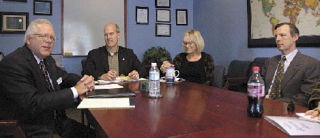MARYSVILLE — Representatives of the Snohomish County business community met with U.S. Rep. Rick Larsen, Oct. 27, at the Greater Marysville Tulalip Chamber of Commerce for a roundtable discussion of the economic issues impacting them.
Larsen predicted that, in the third week of November, the current membership of Congress would likely convene a “lame duck” session to consider a second stimulus package, which Larsen asserted would shift the focus from short-term financial rescue to long-term economic recovery and job growth.
“Most estimates give the economy 12-15 months before it gets through its downturn,” Larsen said. “It’s irrelevant to ask if we’re in a recession because people are acting like we are, so the question becomes, what do we do now?”
Larsen outlined priorities including transportation and other infrastructure investments, which he estimated would foster thousands of jobs within the state, as well as extensions of unemployment benefits, expansions of food stamp programs, and promotion of job training, searching and other assistance.
“With Meridian shutting down and Milgard dropping 80 workers, it’s hard to say we’re done seeing a downturn in this state,” Larsen said. “Washington is doing relatively better, but we’re probably ‘catching down’ to the rest of the country.”
Al Aldrich and Caldie Rogers, of the Greater Marysville Tulalip Chamber of Commerce, reported the results of a recent telephone and Internet survey of Chamber members, which is made up of 84 percent small businesses with under five employees, and 92 percent small businesses with under 10 employees.
Aldrich described the responses as mixed, noting that some businesses have expanded, while a number of others are experiencing troubles. Among those hit hardest are builders, developers and suppliers, as well as those who benefit either directly or indirectly from Boeing and its employees, such as hairdressers and espresso stands.
“Car sales are down, both here and in Everett,” Aldrich said. “The service sector is mixed. People are putting off automobile maintenance and dental care, waiting until things break to fix them. Computer maintenance is actually up, but sales of new computers are down as people defer upgrades.”
Aldrich explained that Chamber members worry about increased business taxes and regulation, while Rogers credited the Tulalip Casino and Seattle Premium Outlets with helping to make Marysville a “shopping destination,” especially for Canadians motivated by a relatively weak dollar. This assessment was echoed by Sue Ambler, president and CEO of the Snohomish County Workforce Development Council, whose family members drive as far as 20 miles to do all their shopping in the Marysville area.
Attorney Paul McConnell, of the Law Offices of Hansen, McConnell and Pellegrini on Third Street in Marysville, offered a different perspective.
“The other end of town, in old Marysville, is not as rosy,” McConnell said. “We’ve got tumbleweeds here. I’ve got clients in the building trade, and it’s dying. They jumped in during the small business boom and that’s become a bust. Even if the economy starts moving and credit starts flowing again, how long will it take for it to go from zero to 20, and will that be in time to save their bacon before it’s fried?”
As McConnell expressed concern about the ponderous pace of development, Aldrich voiced support for low-income heating as we head into the winter months, and Rogers worried that even a small sales tax increase to purchase a car could result in lost automobile sales.
Jennifer Shaw, of the Arlington-Smokey Point Chamber of Commerce, agreed that members of the Arlington business community share many of the same concerns as their Marysville neighbors.
“We’ve had four local businesses close down in the past week and a half,” said Shaw, listing not only Meridian and Milgard, but also Welco Lumber and Bruce and Becky’s Interiors. “We’re asking WorkSource what these employees can do, and how their employers can help. Businesses like Flowers By George are dealing with the rising costs of healthcare and fuel, especially since they’re a delivery service. It makes me heartsick to see vacant shops in our downtown.”
Ambler directed businesses to Workforce’s soon-to-go-live Web portal, at http://helpforhardtimes.org, which also includes resources from the United Way, Volunteers of America, the Salvation Army and several area community colleges.
“Anyone can get on and get resources on how to deal with problems ranging from payroll to layoffs,” Ambler said. “This is the first time we’ve ever had middle-income people filing for TANF [Temporary Assistance for Needy Families] and food stamps. There’s a whole new population that’s never gone to this side before.”
Rogers pointed out that military families are often the beneficiaries of such programs and cited the Chamber’s efforts to help military spouses obtain employment, as well as to find funding for gaps in medical coverage for disabled members of military families. She also touted the Chamber’s upcoming “Buy Local” marketing campaign, which she’s approached newspapers such as The Marysville Globe about running.
Ambler deemed her group’s greatest challenge as one of human resources, since Workforce receives funding for employment programs, but not enough for the personnel needed to administer them.
“We have no extra money for staff,” Ambler said. “Our demand has gone up, but our model is still based on unemployment being 3.4 percent. Leveraging won’t take care of it. Other companies want to hire laid-off employees, but with nobody to train them, they have no bridge. We don’t even have additional people to process vouchers.”
“More than anything, this economic crisis is a crisis of confidence,” McConnell said. “Money is a promise of an exchange for equal value. It’s also a crisis of vision. In the 1930s, we built ourselves out of the Depression. We’ve already jumped past recession into a depression. We need to offer people the dignity of work.”


